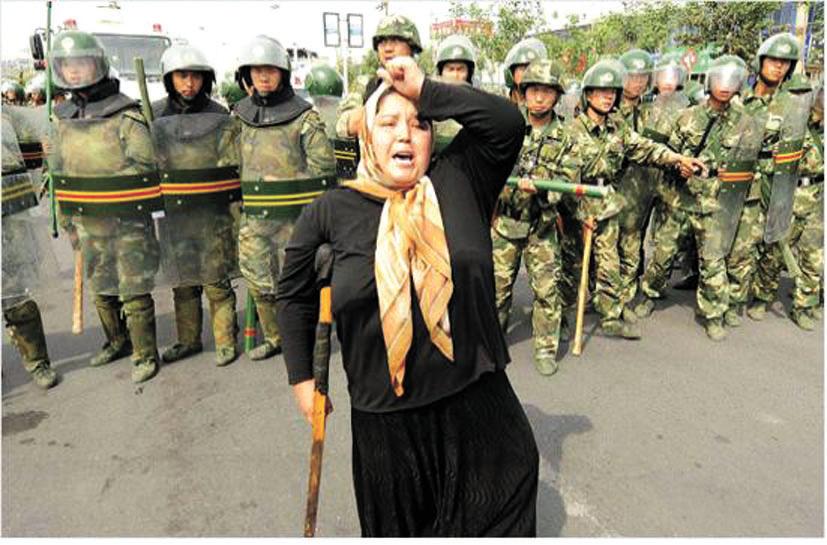 |
||
| ▲ Chinese army repressing protest in Xinjiang. | ||
Xi Jinping announced “Terrorism, separatism, and extremism are not be tolerated.” However, the strength and frequency of terror in Xinjiang Uygur Autonomous Region is increasing. Unlike the previous acts of terrorism, recently these acts of terror have been directed towards an unspecified number of civilians. Why is the terrorism in Xinjiang Uygur’s Autonomous Region of China continuing? Why the relationship between Xinjiang and the Chinese government isn’t improving? The Dankook Herald (DKH) investigated the background culture and history of Xinjiang and the perspective of the Chinese government.
Q. What are the cultural and historical features of Xinjiang?
A. The Xinjiang Uygur people believe in Islam. They have a hardy attachment to their own national language and characteristics compared to other ethnic groups. The Uygur people have preserved various scriptures and legal documents dating back several generations until now. Xinjiang Uygur’s Autonomous Region of China was incorporated into China during the Qing Dynasty. After the founding of the People’s Republic of China the Uygur people were essentially neglected until China occupied Xinjiang by force in 1949.
Q. What are the reasons for the present state of terrorism in Xinjiang?
A. The friction has been ongoing since Xinjiang Uygur’s Autonomous Region was incorporated into China in 1949. However the separatist movement, led by university students in Xinjiang, only became violent during the 1990s. Currently, serious terrorisms are occur frequently in other parts of China and also the Xinjiang Uygur’s Autonomous Region. There are two major causes. First of all, the mass migration of the Han people and ‘principle of party advantage’ has threatened the existence of the Xinjiang Uygur’s Autonomous Region. The Han people threatened the culture of Uygur people through political and cultural assimilations critically. Secondly, the Xinjiang Uygur's Autonomous Region has abundant energy resources, though because of centralist control of the economic conditions by the Han people, the economic environment of Xinjiang has only worsened severely. This situation led to the development of an atmosphere of discontent and anger amongst the Uygur.
Q. What efforts have the Chinese government made to prevent terrorisms up till now?
A. So far, China has guaranteed ethnic minorities the rights to maintain their own customs, language and traditions. However, Oh Jong-hyuk (researcher at the Korean Institute for International Economic Policy) said, “These ethnic policies are not legislated clearly. Minorities have religious freedom, but their missions are prohibited by law.” He also pointed out the problems of the superficial appeasement policy of the Chinese government. Meanwhile, Chinese authorities killed 13 suspects of car bomb attack in Xinjiang. The government took a hardline policy toward terrorism without exception.
Q. Why won’t Chinese authorities agree to the separatists demands for a free Xinjiang?
A. China recognizes the importance of strategic locations across the Eurasian continent. Xinjiang is one such location. There are four reasons for its importance. First, Xinjiang connects China and Europe. It serves as a fortress for Chinese security. Second, the transportation and communication networks of the Eurasian continent cross Xinjiang, which enables China to advance the Pacific ocean region and become a significant hub for distribution. Third, Xinjiang is a rich repository of natural resources. Forth, in order to become a powerful country, the stability of the western border, which is Xinjiang, is very important. Also, its stability is the absolute prerequisite condition for social and economic benefits for China.
The Chinese government must begin by minimizing the pressure and discrimination of Xinjiang. Further, by using infrastructure and allocating resources efficiently, the government should build a strong trust-based relationship within China. In order to solve the ‘de facto inequality’ that exists between the Han people and the Uygur, a new policy approach to politics, education, society and economy must be demonstrated. However, such positive measures will be nothing if the idea of Han chauvinism, which is so deep-rooted in Chinese minds, doesn't turn into a “true respect for pluralism”. If Han chauvinism remains on the mind of the Chinese, then the stability of Chinese politics and society will remain under threat.
Seo Min-ji, Kang Da-yon anhj12261226@gmail.com

![[Campus Magnifier] Let's Surf the Library!](/news/photo/202404/12496_1765_4143.jpg) [Campus Magnifier] Let's Surf the Library!
[Campus Magnifier] Let's Surf the Library!
![[Campus Magnifier] Let's Surf the Library!](/news/thumbnail/202404/12496_1765_4143_v150.jpg)





